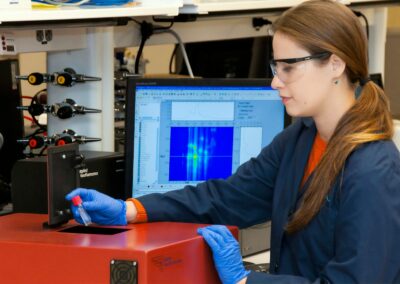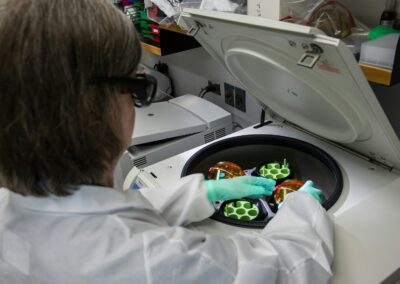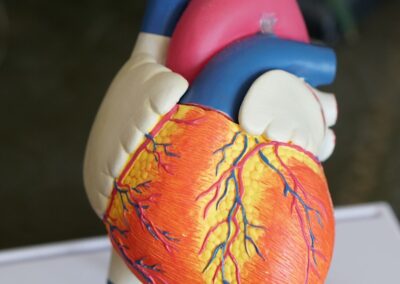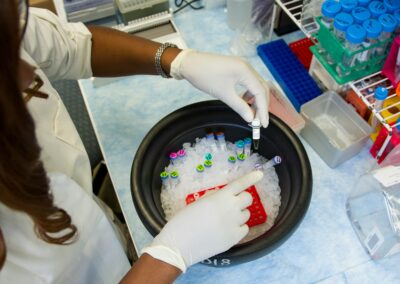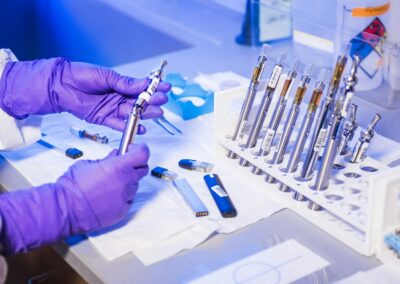Introduction to Genetic Augmentation
Understanding Genetic Augmentation
Genetic augmentation involves modifying the genes of organisms to enhance desired traits or eliminate undesired ones. This revolutionary technology has the potential to address some of the most pressing global health challenges, such as antimicrobial resistance and emerging diseases. As the world grapples with these issues, genetic augmentation offers promising solutions that could reshape the future of healthcare.
Countries like Saudi Arabia and the UAE, with their strong commitment to advancing modern technology, are well-positioned to lead the way in genetic research and its applications. Riyadh and Dubai are becoming centers of innovation, making significant investments in biotechnology and healthcare infrastructure. These efforts align with their broader goals of economic diversification and becoming leaders in scientific research.
Genetic augmentation, while still in its nascent stages, brings both opportunities and challenges. It holds the potential to revolutionize healthcare by creating more effective treatments and preventive measures. However, it also raises ethical and regulatory questions that must be carefully navigated to ensure responsible development and implementation.
Combating Antimicrobial Resistance
One of the most significant global health challenges today is antimicrobial resistance (AMR). The overuse and misuse of antibiotics have led to the emergence of resistant strains of bacteria, making infections harder to treat and increasing the risk of disease spread, severe illness, and death. Genetic augmentation can play a crucial role in combating AMR by developing new methods to enhance the efficacy of existing antibiotics and creating alternative treatment options.
For instance, genetic modification can be used to engineer bacteria that are susceptible to existing antibiotics or to develop new antimicrobial agents that target resistant strains. In Saudi Arabia and the UAE, where advanced healthcare systems are a priority, investing in genetic research to tackle AMR could significantly improve public health outcomes and reduce the burden of resistant infections.
Additionally, genetic augmentation can help in the development of rapid diagnostic tools that can identify resistant strains quickly and accurately. This would enable healthcare providers to administer the most effective treatments promptly, reducing the spread of resistant bacteria and improving patient outcomes.
Addressing Emerging Diseases
The emergence of new diseases poses a continuous threat to global health. Recent outbreaks, such as COVID-19, have highlighted the need for rapid and effective responses to new pathogens. Genetic augmentation offers powerful tools to address these emerging health threats by enabling the development of targeted treatments and vaccines more efficiently than traditional methods.
In the context of Saudi Arabia and the UAE, leveraging genetic augmentation for emerging disease management can enhance their preparedness and response capabilities. These countries have the resources and infrastructure to conduct cutting-edge genetic research and translate findings into practical healthcare solutions. By focusing on genetic technologies, they can improve their ability to combat new diseases swiftly and effectively.
Moreover, genetic augmentation can facilitate the creation of vaccines that are more effective and quicker to produce. For example, mRNA vaccines, which have shown great success against COVID-19, are a product of advanced genetic research. Expanding such technologies can ensure that countries are better equipped to handle future pandemics and health crises.
Ethical and Regulatory Considerations
Ensuring Ethical Development
While the potential benefits of genetic augmentation are vast, ethical considerations must be at the forefront of its development. Issues such as consent, privacy, and potential long-term impacts need to be addressed to ensure that genetic technologies are used responsibly and ethically. Public engagement and education are essential to build trust and ensure that the public is informed about the benefits and risks associated with genetic augmentation.
Saudi Arabia and the UAE can play a leading role in developing ethical guidelines and regulatory frameworks for genetic augmentation. By setting high standards and promoting transparency, these countries can ensure that genetic technologies are developed and used in ways that benefit society as a whole. Collaboration with international bodies and experts can further enhance the ethical governance of genetic research.
Furthermore, equitable access to genetic augmentation technologies must be ensured to prevent widening the gap between different social groups. Policies that promote inclusivity and fair distribution of genetic advancements will be crucial in ensuring that the benefits of genetic augmentation are shared broadly across society.
Regulatory Frameworks
Developing robust regulatory frameworks is critical to manage the risks associated with genetic augmentation. Regulations should address the safety, efficacy, and ethical implications of genetic modifications. These frameworks must be flexible enough to accommodate rapid advancements in technology while ensuring rigorous oversight and accountability.
In the Middle East, regulatory bodies in Saudi Arabia and the UAE are well-placed to create comprehensive regulations that can serve as models for other regions. By collaborating with international regulatory agencies, these countries can harmonize standards and facilitate global cooperation in genetic research and its applications.
Moreover, fostering public-private partnerships can accelerate the development and implementation of genetic technologies. Such collaborations can bring together the expertise and resources of various stakeholders, driving innovation while ensuring that ethical and regulatory standards are upheld.
Conclusion
Genetic augmentation holds the promise of addressing some of the most significant global health challenges, including antimicrobial resistance and emerging diseases. By investing in genetic research and developing robust ethical and regulatory frameworks, countries like Saudi Arabia and the UAE can lead the way in harnessing the potential of genetic technologies for the betterment of public health.
As we move forward, it is essential to balance the benefits of genetic augmentation with responsible development and implementation. Ensuring that ethical considerations and equitable access are prioritized will be crucial in maximizing the positive impact of genetic technologies on global health. With careful planning and collaboration, genetic augmentation can pave the way for a healthier, more resilient future.
#GeneticAugmentation #GlobalHealth #Biotechnology #SaudiArabia #UAE #Riyadh #Dubai #ArtificialIntelligence #Blockchain #TheMetaverse #ExecutiveCoaching #GenerativeAI #ModernTechnology #BusinessSuccess #LeadershipSkills #ProjectManagement



